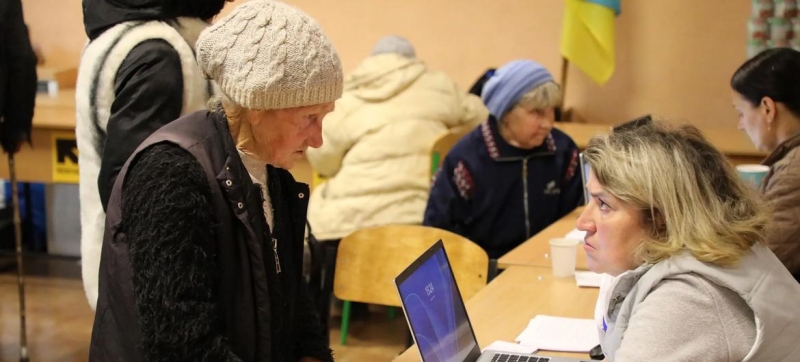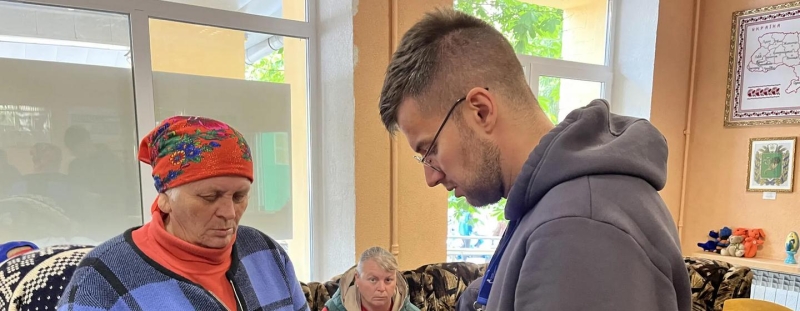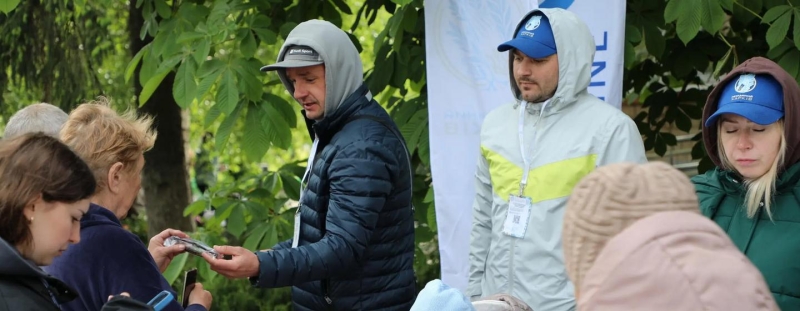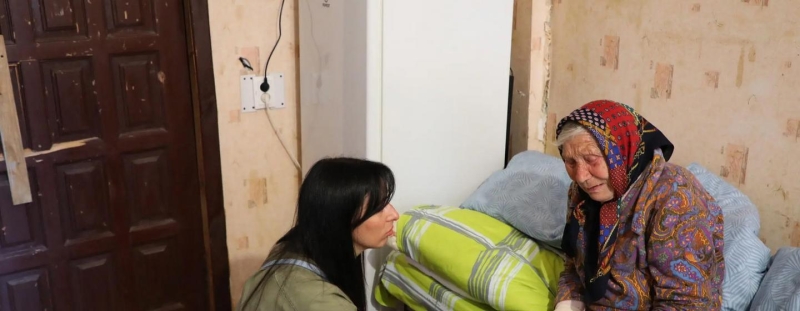
An elderly woman registers at a transit center in Kharkiv. “We need everything, from toothbrushes to clothes”: stories of evacuated residents of the Kharkiv region Humanitarian aid
65-year-old Valentina arrived at the transit center in Kharkov from the village of Okhrimovka, located just 4 km from the border. She and her daughter left by car, and a family friend helped them evacuate.
“We had a house and a garden”
“Those were terrible days , we had to hide in the basement of our house due to constant shelling,” recalls Valentina. “We left in a hurry, taking only a small bag with things with us. Now we need everything, from toothbrushes to clothes.”
In just three weeks, more than 12,000 people who fled their homes due to intense attacks on front-line settlements registered at the transit center in Kharkov. The evacuees had to leave behind all their belongings, many of them are now almost completely dependent on the help of the authorities and humanitarian organizations.

Valentina at the transit center.
Holding back tears, Valentina talks about her life in Okhrimovka: “We had a house and a well-kept garden where we grew our own vegetables. This helped us survive. Leaving all this behind, knowing that my friends and family are still there, that’s the hardest thing,” she said.
Their friend found them a modest apartment in Kharkov. At the transit center, Valentina registered to receive financial assistance. She was also given bedding and household items.
Evacuation and Transit Center
Since May 10, approximately 50 humanitarian organizations, including UN humanitarian agencies, have supported efforts to evacuate residents of the Kharkov region and provide assistance to them in the transit center and temporary accommodation sites.
“People were evacuated with the support of humanitarian organizations, and some arrived on their own,” explained center employee Irina. She joined the team last year after her husband, a volunteer from the Kharkov region, died during an evacuation in the Kupyansky district.
“In the transit center, people receive food, water, clothing, mattresses, bedding, household items, hygiene products and other things they need,” she added.

Humanitarian organizations are distributing aid to evacuees.
Humanitarian organizations also provide legal support to people, including to provide them with housing, land and property as compensation for damaged or destroyed property.
“Many Those who come here are elderly people. Some people had to move more than once. They are under severe stress; some are seriously injured or experiencing panic attacks,” says Yaroslav from the non-governmental organization FHI360. Psychologists work in the transit center to provide support to victims.
Monetary assistance
The most popular type of assistance is cash, since evacuees can use it to buy the basic necessities.
“This money means they can buy what they need most. For some it may be clothing or food; for others, medicines,” explains Anatoly, an employee of the humanitarian organization “Right to Protection.”
The humanitarian multi-purpose cash assistance program in Ukraine is one of the largest in the world, with almost 50 humanitarian organizations. Since February 2022, partners have provided cash support to more than 10 million people.
Collective Accommodation Centers
“Most of the evacuees found shelter in the homes of their relatives and friends,” says Irina. “Those who had nowhere to go were placed in collective centers organized in dormitories and other vacant premises suitable for temporary residence.”
Since mid-May, approximately 1,000 people, including more than 70 children and 140 people with limited mobility, have been housed in 46 collective centers in and around Kharkov.

An elderly woman in a collective accommodation center.
In these centers, people receive food packages, hot meals, water, hygiene and household items, cash assistance, medical assistance and psychological support.
“All hygiene products, everything we need is in these boxes, including clothes. Even a few colorful hairpins!” – said Tamara. She and her husband Nikolai received a family room in a collective center after their home in Slobozhanskoye was damaged by shelling.
“The needs are growing as everyone arrives more and more people,” says Vita, a Ukrainian Red Cross volunteer from Volchansk.
She left with her family in the first days of evacuation and now devotes all her time to support of others: “I will continue as long as it is necessary. These are my people and they need help.”
